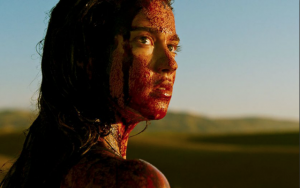REVENGE: 3 STARS. “river of cinematic plasma that flows through it.”
 There blood, there’s bloody and then there’s the river of cinematic plasma that flows through the aptly named “Revenge” from first time French writer-director Coralie Fargeat. Gory and uncompromising, this is a violent vision for those with a love of Grand Guignol cat-and-mouse games and a strong stomach.
There blood, there’s bloody and then there’s the river of cinematic plasma that flows through the aptly named “Revenge” from first time French writer-director Coralie Fargeat. Gory and uncompromising, this is a violent vision for those with a love of Grand Guignol cat-and-mouse games and a strong stomach.
Set in a remote, desert bound luxury villa, “Revenge” is the unsettling story of three wealthy men, the arrogant Richard (Kevin Janssens) and pals Stan (Vincent Colombe) and Dimitri (Guillaume Bouchede) and one woman, Jen (Matilda Lutz). Jen is Richard’s mistress, seduced by his good looks and the perks his money offers, i.e. cocaine and private helicopters. The men are there for the good times and an annual hunting trip. What begins as a glamorous, sexy getaway turns foul when Stan sexually assaults Jen. When she tearfully tells Richard what happened he tells her to brush it off, not to worry about it. When she threatens to tell his wife about their affair unless he does something about Stan he turns nasty. And so does the movie. Chased out into the desert, Jen is pushed over a cliff, impaled on a sharp branch and left for dead.
Suffice to say that will not be the last bloodshed offered up in “Revenge’s” operatic tale of vengeance. With self-determination, a beer can and some self-surgery Jen survives with a new lease on life and vengeance in her heart.
“Revenge” is not a subtle movie. It is an exploitation flick that builds tension by taking its time between scenes of extremely graphic violence. Close-ups of fire ants swarming a rotted apple and Dimitri’s slo mo marshmallow mastication are add to the film’s disquieting atmosphere.
Clearly Fargeat has passed her days studying not only grindhouse gore but Michelangelo Antonioni films as well. The result is a blood-splattered art film that revels in its baseness.
As the title suggests “Revenge” is all about revenge but unlike most sex vengeance films this one is filtered through a female perspective. It is still hard to take but the transition from suffering to strength sets it apart from usual exploitation fare.
